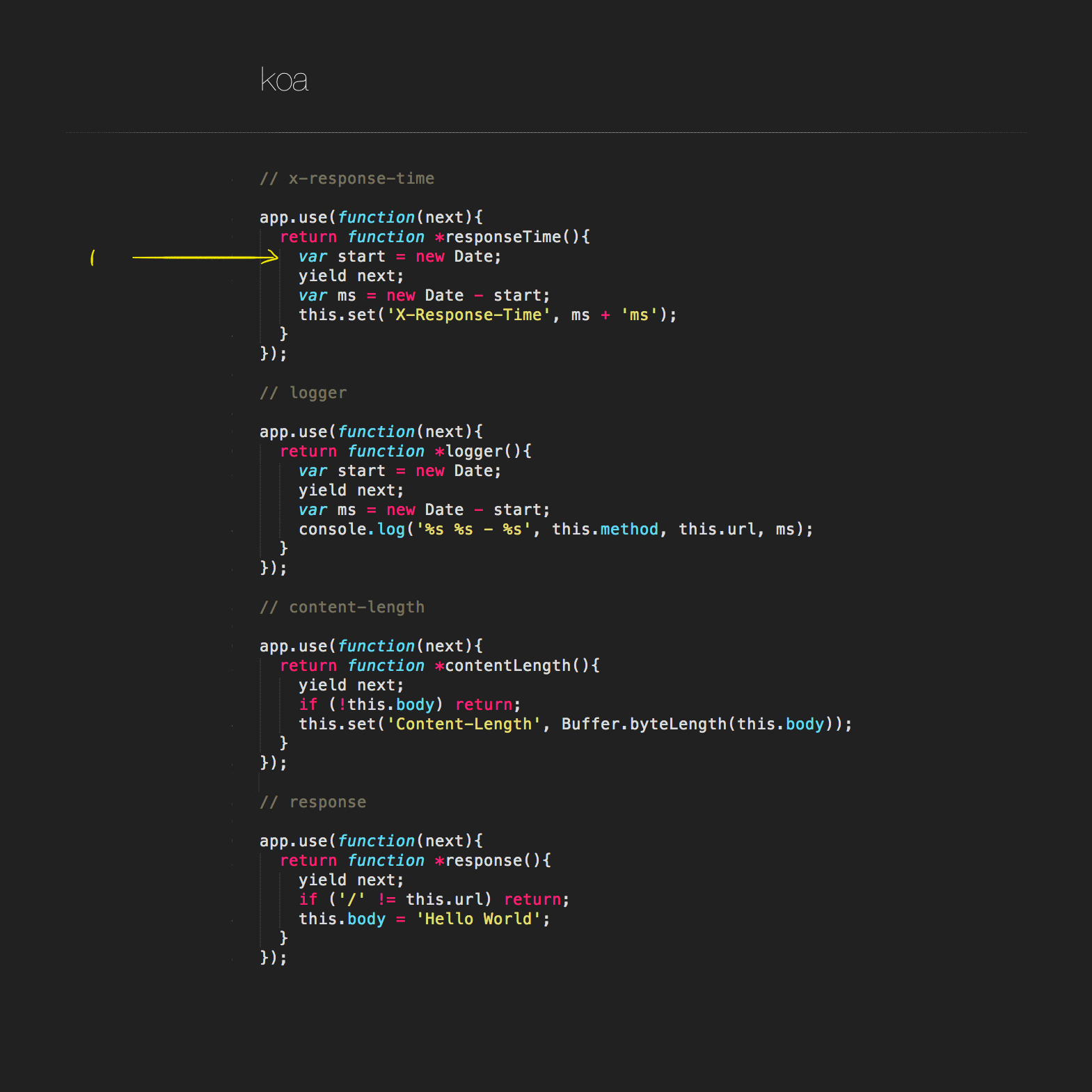159 lines
4.4 KiB
Markdown
159 lines
4.4 KiB
Markdown
|
|
## Writing Middleware
|
|
|
|
Koa middleware are simple functions which return a `GeneratorFunction`, and accept another. When
|
|
the middleware is run by an "upstream" middleware, it must manually `yield` to the "downstream" middleware.
|
|
|
|
For example if you wanted to track how long it takes for a request to propagate through Koa by adding an
|
|
`X-Response-Time` header field the middleware would look like the following:
|
|
|
|
```js
|
|
function responseTime(next){
|
|
return function *(){
|
|
var start = new Date;
|
|
yield next;
|
|
var ms = new Date - start;
|
|
this.set('X-Response-Time', ms + 'ms');
|
|
}
|
|
}
|
|
|
|
app.use(responseTime);
|
|
```
|
|
|
|
Here's another way to write the same thing, inline:
|
|
|
|
```js
|
|
app.use(function(next){
|
|
return function *(){
|
|
var start = new Date;
|
|
yield next;
|
|
var ms = new Date - start;
|
|
this.set('X-Response-Time', ms + 'ms');
|
|
}
|
|
});
|
|
```
|
|
|
|
If you're a front-end developer you can think any code before `yield next;` as the "capture" phase,
|
|
while any code after is the "bubble" phase. This crude gif illustrates how ES6 generators allow us
|
|
to properly utilize stack flow to implement request and response flows:
|
|
|
|

|
|
|
|
1. Create a date to track duration
|
|
2. Yield control to the next middleware
|
|
3. Create another date to track response time
|
|
4. Yield control to the next middleware
|
|
5. Yield immediately since `contentLength` only works with responses
|
|
6. Yield upstream to Koa's noop middleware
|
|
7. Ignore setting the body unless the path is "/"
|
|
8. Set the response to "Hello World"
|
|
9. Ignore setting `Content-Length` when no body is present
|
|
10. Set the field
|
|
11. Output log line
|
|
12. Set `X-Response-Time` header field before response
|
|
13. Hand off to Koa to handle the response
|
|
|
|
|
|
Note that the final middleware (step __6__) yields to what looks to be nothing - it's actually
|
|
yielding to a no-op generator within Koa. This is so that every middleware can conform with the
|
|
same API, and may be placed before or after others. If you removed `yield next;` from the furthest
|
|
"downstream" middleware everything would function appropritaely, however it would no longer conform
|
|
to this behaviour.
|
|
|
|
For example this would be fine:
|
|
|
|
```js
|
|
app.use(function(){
|
|
return function *response(){
|
|
if ('/' != this.url) return;
|
|
this.body = 'Hello World';
|
|
}
|
|
});
|
|
```
|
|
|
|
It's important to note that not all middleware will need to conform, the best example of this
|
|
is a router, which are typically always acting as end-points, or downstream middleware:
|
|
|
|
````js
|
|
app.use(get('/', function *(){
|
|
this.body = 'Hello World';
|
|
});
|
|
```
|
|
|
|
Next we'll look at the best practices for creating Koa middleware.
|
|
|
|
## Middleware Best Practices
|
|
|
|
This section covers middleware authoring best practices, such as middleware
|
|
accepting options, named middleware for debugging, among others.
|
|
|
|
### Middleware options
|
|
|
|
When creating public middleware it's useful to conform to the convention of
|
|
wrapping the middleware in a function that accepts options, allowing users to
|
|
extend functionality. Even if your middleware accepts _no_ options, this is still
|
|
a good idea to keep things uniform.
|
|
|
|
Here our contrived `logger` middleware accepts a `format` string for customization,
|
|
and returns the middleware itself:
|
|
|
|
```js
|
|
function logger(format){
|
|
format = format || ':method ":url"';
|
|
|
|
return function(next){
|
|
return function *(){
|
|
var str = format
|
|
.replace(':method', this.method)
|
|
.replace(':url', this.url);
|
|
|
|
console.log(str);
|
|
|
|
yield next;
|
|
}
|
|
}
|
|
}
|
|
|
|
app.use(logger());
|
|
app.use(logger(':method :url'));
|
|
```
|
|
|
|
### Named middleware
|
|
|
|
Naming middleware is optional, however it's useful for debugging purposes to
|
|
assign a name.
|
|
|
|
```js
|
|
function logger(format){
|
|
return function(next){
|
|
return function *logger(){
|
|
// ^-- name this guy
|
|
}
|
|
}
|
|
}
|
|
```
|
|
|
|
## Async operations
|
|
|
|
The [Co](https://github.com/visionmedia/co) forms Koa's foundation for generator delegation, allowing
|
|
you to write non-blocking sequential code. For example this middleware reads the filenames from `./docs`,
|
|
and then reads the contents of each markdown file in parallel before assigning the body to the joint result.
|
|
|
|
|
|
```js
|
|
var fs = require('co-fs');
|
|
|
|
app.use(function(){
|
|
return function *(){
|
|
var paths = yield fs.readdir('docs');
|
|
|
|
var files = yield paths.map(function(path){
|
|
return fs.readFile('docs/' + path, 'utf8');
|
|
});
|
|
|
|
this.type = 'markdown';
|
|
this.body = files.join('');
|
|
}
|
|
});
|
|
```
|
|
|